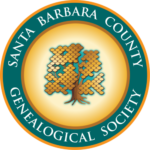Exhibit: Santa Barbara Asian American & Pacific Islander Heritage, 1870s-1970s
Motome Kay Saruwatari (1936-2021)
Devoted mother, active community member
By Patti Ottoboni
On December 14, 1936, Motome Kay Saruwatari, was born in the farming town of Arroyo Grande, California to Akira and Masako Fukamaki Saruwatari. Her history in Santa Barbara County starts with her grandparents, Kinzo and Momoju Saruwatari.
Arrival in America
Kay’s grandparents, Kinzo Saruwatari and his wife, Momoju Kozuma Saruwatari, were born and wed in Kumamoto, Japan. In December 1902, they arrived in Honolulu, Hawaii and worked in sugar cane plantations. They immigrated to San Francisco in 1904 and settled in Oceano where, clearing their land, the Saruwatari’s began farming. Around 1922, the Saruwatari’s moved to Los Berros and were possibly the first in the area to farm strawberries. Their farm dynasty encompassed three generations who tilled more than 100 acres in the valley. The family’s farmhouse still stands directly across the road from the Halcyon Store. Kinzo and Momoju had two daughters, who passed away, and three boys, Akira, born in 1910, Stone, 1912, and Joe in 1914. Our story will follow Akira, Motome Kay Saruwatari’s father.
On November 5, 1932, at the Buddhist Temple near San Luis Obispo, Akira Saruwatari, 22, and Miss Masako Fukamaki,19, wed in the presence of 150 friends and relatives. After their honeymoon, they returned to Arroyo Grande to make their home at the Brieger Cottage on West Branch Street.
Akira attended public schools, Japanese Language School, and Hiles Watchmaking School in San Francisco and opened a jewelry store in Arroyo Grande. From 1936 to 1942 he owned Aki’s Market and Radio Service on East Branch Street and was one of the few Nisei who was financially independent before the war. They had four daughters— Aiko Barbara, Motome Kay, Yukiko Diane, and Ann Margaret.
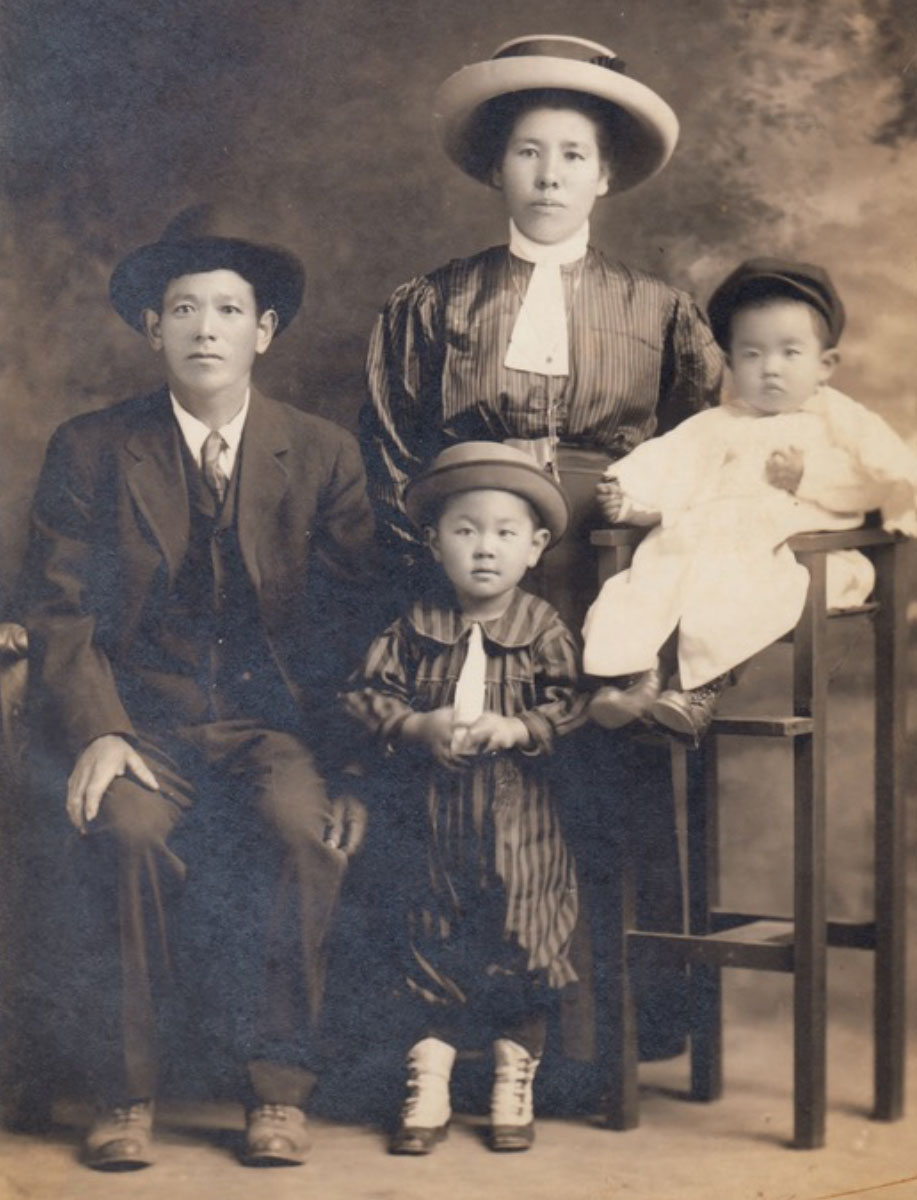
Kinzo and Momoju Saruwatari with sons Akira and Stone, 1913
Internment
On February 19, 1942, Executive Order 9066 was issued, targeting Japanese Americans. In March, with no buyer for Aki’s store, he sold the stock and fixtures at a discount. Special tools and equipment, furniture, and a car were stored with Caucasian friends. In September, the Saruwatari family was interned in the Gila River Relocation Center, within the Gila River Indian Reservation southeast of Phoenix, Arizona. In August 1943, Akira was relocated to Chicago and stayed with relatives. His wife and family joined him the following year after he secured a job and found living accommodations in the parsonage of Wesleyan Methodist Church. Akira went into business with two other friends to establish a radio repair shop.
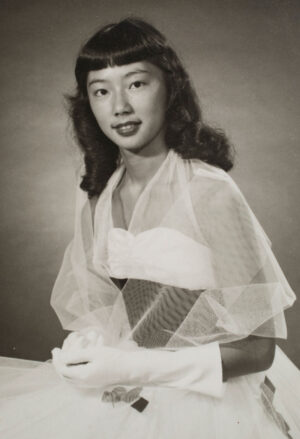
Teenage Kay Saruwatari
Starting Over
In 1946, the family was able to return to California and settled in Santa Barbara living with Fukamaki relatives of Masako Fukamaki Saruwatari. They lived in a two-bedroom home with two families of five each. Akira obtained a job as a radio repairman and bought a house on Voluntario Street with money he wisely put in the bank before internment. That same year the last daughter joined the family.
Growing Up
Kay attended local schools, graduating from Santa Barbara High School in 1954. She played cello in the orchestra and sang in triple trio. Dear friend Donnie Yee encouraged her to attend SBCC where she was Student Body Treasurer and earned her AA degree. She served on the SBHS Alumni Association Board of Directors and as a key member of the Class of ‘54 Reunion Committee.
In 1958, Kay married Robert Yamada. Four daughters joined the family— Linda, Adele, Denise, and Marie. Kay felt privileged to be a “stay-at-home mom” enjoying volunteer work at Mountain View School, receiving a PTA Lifetime Achievement Award. She also served as Brownie/Girl Scout leader. Following her divorce in 1989, Kay became a “Reach to Recovery” speaker for the local Cancer Society and received a Volunteer Service Award.
In 1986, Kay began an 18-year career with the SB County Treasurer-Tax Collector, retiring as Department Business Manager. In 1989, she married former high school classmate Dennis Brown who succumbed to cancer in 1994. A final marriage to Bill Van Horn, a friend since the seventh grade, occurred in 2001. During this period of her life, Kay became very involved with the Asian-American Committee of the Santa Barbara Trust for Historic Preservation.
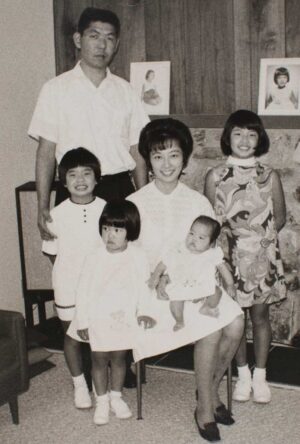
Young Yamada Family
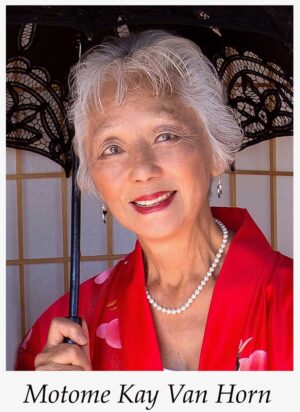
Kay passed away on May 12, 2021 and is survived by her husband Bill, four daughters, six grandchildren, and three sisters.
Passing of the Elders
Kinzo Saruwatari passed away on January 7, 1970, at age 98. His wife, Momoju Kozuma Saruwatari passed away in 1941, and their son Joe, in 1964.
Akira Saruwatari, Kay’s father, passed away on September 5, 1990 at age 80. His wife, Masako Fukamaki Saruwatari passed away in 2008 at age 95.
Kay’s maternal grandfather, Inokichi Fukamaki, passed away on January 20, 1955 at 81 and his wife, Ai Furukawa Fukamaki, passed away September 16, 1976, at age 85.
Acknowledgements
Linda Yamada Weisman
References
Ancestry.com
FamilySearch.org
Akira Saruwatari, Obituary 20B-243, Santa Barbara County Genealogical Society (https://sbgen.org/start-your-search/search-database/#/search/); citing Obituary Scrapbooks, held by the Santa Barbara Historical Museum, Gledhill Library.
Masako Saruwatari, Obituary 20D-233, Santa Barbara County Genealogical Society (https://sbgen.org/start-your-search/search-database/#/search/); citing Obituary Scrapbooks, held by the Santa Barbara Historical Museum, Gledhill Library.
Santa Barbara Trust for Historic Preservation
Photo of Kinzo and Momoju Saruwatari with sons Akira and Stone, 1913 provided courtesy of: Gene Saruwatari Collection, Re/Collecting Project Archive, Special Collections and Archives, California Polytechnic State University, San Luis Obispo.
The other pictures are courtesy of the Saruwatari family.
